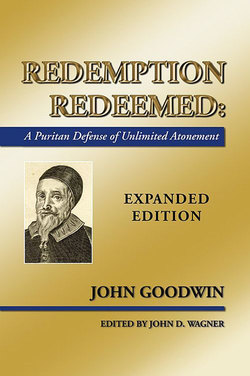Читать книгу Redemption Redeemed - John Goodwin - Страница 10
На сайте Литреса книга снята с продажи.
CHAPTER IV Wherein the Scriptures of the fourth and last association, propounded in Chap. I, as pregnant also with that great truth hitherto maintained, are impartially weighed and considered.
ОглавлениеWE shall, God assisting, examine every of these Scriptures particularly, and so shall have occasion to exhibit the purport and tenor of them respectively as they shall be produced to act their several parts in order. We shall not here transcribe them, especially considering the reader may with very little pain see them in their muster, Chap. I; but shall only point at their several dwellings or situations in the Book of God, which are these: Rom. xiv. 15; 1 Cor. viii. 11; 2 Pet. ii. 1; 2 Pet. ii. 20; Heb. x. 29; Matt. xxiii. 32, 33; &c. We make these Scriptures of one and the same combination, and associate them by themselves because their import is in effect one and the same, they all supposing that Christ hath died for those who may perish notwithstanding, yea, for those who will perish. And, certainly, if he died for those who, not withstanding his dying for them, may perish, yea, and for those who will actually perish, as well as for those who shall be saved, he died for all men without exception.
As for that opinion of the Valentine Council, in France, mentioned by Estius1 and adopted by him, as it seems, for his own, which supposeth some reprobates, as he calleth them, to have been redeemed by Christ, but not all,—this opinion, I say, is not like, as far as I conceive, to make many proselytes. Nor will it attract the judgments of considering men. For if the dying of Christ for men is to be esteemed a matter of love to them, as without all controversy and question it ought, what reason can there be imagined why he should die for apostate reprobates, (who yet are that kind of reprobate for which only Christ died, according to that opinion), rather than for those who, though living and dying in unbelief, yet never contracted the guilt of so desperate and provoking a sin? But this by the way.
The tenor of the Scripture first in view, amongst those lately appearing, is this: “Destroy not him with thy meat, for whom Christ died,” Rom. xiv. 15.
1. The Greek word accurately translated “destroy” is apollymi. That the destruction here spoken of, whereunto the strong Christian is so earnestly admonished and dehorted by the apostle from exposing the weak, is not any temporal destruction, but that which is of body and soul forever, is more clear than to require proof. It is not easily imaginable how or that a strong Christian, or any other man, by eating meat sacrificed unto idols, should expose a weak Christian unto the danger of any other destruction, but of that only which is decreed by God against those who shall depart from the faith, or finally apostatise from the profession of Christ. Besides, it is every man’s notion, that this is that destruction, that first-born of things formidable and dreadful unto the precious souls of men, with which this great apostle had so much to do, and from which the great prize that he runs for with all his might in all his epistles, was to deliver them.
2. Whereas he chargeth men not to destroy those “for whom Christ died,” though he doth not indeed suppose that all those shall be actually destroyed or perish, whom another may be said to destroy, i. e., to do things tending to their destruction, which is the sense of the word in this place. Yet this he clearly supposeth, that such men “for whom Christ died” are obnoxious to destruction, may be destroyed, and perish everlastingly. Otherwise we shall quench the spirit of his zealous tenderness over the precious souls of weak Christians, expressed in this serious item or charge unto others, not to destroy them; yea, and make him speak very weakly, and, indeed, ridiculously. To admonish men in a serious and solemn manner, to take heed of destroying those who are out of all possibility of being destroyed, especially this being known to the men that are thus admonished, is as if a man should seriously and affectionately entreat an archer with his bow and arrows about him, to take heed of shooting too high for fear of hurting the sun, and causing it to fall down out of the firmament of heaven.
If it be said; Yea, but though it be supposed, that the persons admonished in this case do know in the general that they, for whom Christ died, are not under a possibility of perishing, yet they may be ignorant in particular, whether those men whose destruction they are like to procure or promote by the abuse of their Christian liberty, be of the number of those men for whom Christ died or no. And consequently the apostle may upon a good account admonish them to take heed of destroying such.
